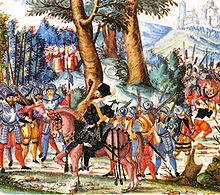Rappen War (Basel)
The black horse war lasted from 1591 to 1594, was a conflict between the city of Basel and the countryside and a farmers' survey against increased wine change ( sales tax ). The uprising was given its name because of the denomination of black coins . It is not to be confused with the Anterior Rappen War from 1612 to 1614 in the neighboring Fricktal and on the Upper Rhine , although it had similar causes.
causes
Between 1586 and 1589, the prices for agricultural products reached a historic high as a result of population growth, the fragmentation of goods, scarcity of resources and the onset of climate deterioration in the course of the so-called Little Ice Age . But the framework conditions also changed in terms of foreign policy, since since the Reformation and Counter-Reformation denominational tensions have burdened the relationship between the individual places of the Old Confederation .
In 1575, Jakob Christoph Blarer von Wartensee , the prince-bishop of Basel , promoted the re-Catholicization of the Birseck and in 1579 allied himself with the Catholic towns of the Confederation. In doing so, he made his relationship with Basel a federal, denominational issue. In the Baden Treaty of 1585 , Basel had to undertake to pay the bishop 200,000 guilders (according to today's value approx. 7.5 million euros ) for the definitive assignment of the pledges if it did not want to lose its urban subject area.
Beginning of the conflict
In order to be able to repay the horrific debt of 200,000 guilders at the time, Basel increased the wine and meat exchange rate by one cent in January 1591. The farmers immediately protested against this "massive" increase in taxes, but the city flatly rejected the landscape's position and treated its representatives as potential leaders. One of them was Osimus Battmann, who was considered one of the main people responsible for the uprising in the Basel government. He was arrested twice and subjected to extensive interrogation.
The subjects turned to the Federal Diet for mediation . This suspended the transfer mandate from the city of Basel for the duration of the brokerage. The other three attempts to find a solution failed because of the negative attitude of the country folk, who repeatedly cited their poverty, the high prices and the generally bad times.
Escalation and resolution
From the autumn of 1593, however, the country folk no longer succeeded in including the agenda in resolving conflicts and their leeway was significantly reduced. The conflict subsequently escalated because the city insisted on its tax mandate. When Basel forbade the disobedient innkeepers to practice their profession, armed Basel bidders marched through the area to prevent the implementation of the innkeeping ban. The City of Thirteen then sent a contingent of 50 riflemen under the command of Captain Andreas Ryff to Liestal on May 13, with the aim of taking military action against the rebels.
On May 15th, an attempt to arrest Hans Siegrist from Niederdorf , one of the chief landowners' leaders, failed. They then ruled extremely violently. They armed themselves and gathered on the Wildsteiner Höhe next to Wildenstein Castle . For his part, Ryff moved with 170 men from Liestal to Bubendorf , in order to await the armed subjects in battle order. There Andreas Ryff knew how to prevent the impending civil war with a diplomatic mixture of understanding, threat and admonition . After a few uncertain days of negotiations between Siegrist and Ryff, the country folk were finally convinced of the need for a tax increase.
Thanks to the negotiated solution, the rulers were able to threefold the income from the wine change, in return the subjects were neither punished for their resistance nor obliged to pay the costs incurred.
literature
Andreas Ryff: The Rappen War. Beginning, middle and end. Everything was described truthfully and neatly by the honor and emergency guard, Captain Andreas Ryff . Nik. Müller, Basel 1833.
